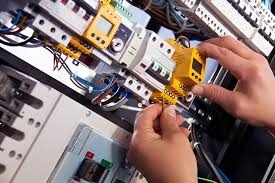Is Commercial Wiring Different from Residential?

Commercial wiring is very different from residential wiring in terms of context, scale, and purpose. As a commercial electrician in London, it’s important for us to have a clear understanding. Let’s tell you the key distinctions:
1. Voltage and Load Capacity
Residential wiring typically operates at 120/240 volts. It is sufficient to power household appliances and lighting. In contrast, commercial wiring systems often use higher voltages, such as 208/240 volts or even 277/480 volts. It is required to accommodate the larger electrical loads required by machinery, HVAC systems, and extensive lighting.
2. Wiring Materials and Design
In residential properties, wiring systems commonly utilise plastic-sheathed cables (such as NM cables) for their cost-effectiveness and flexibility.
On the other hand, commercial properties rely on more robust materials like conduit systems and metal-clad cables. These are designed to withstand harsher environments, such as exposure to moisture, heat, and physical wear, which are less common in residential properties.
3. Electrical Code Requirements
Commercial properties must adhere to stricter electrical codes and regulations due to the potential risks associated with higher electrical loads and more complex systems. For example, fire safety measures, backup power systems, and accessibility standards. These are more rigorously enforced in commercial wiring projects.
4. Circuit Distribution and Complexity
Residential wiring is relatively straightforward, with circuits dedicated to specific rooms or appliances.
However, commercial wiring involves intricate distribution systems that manage multiple circuits that power various equipment. These systems often include three-phase power.
5. Installation Environment
The physical installation environment also differs. Residential wiring is often concealed behind walls and ceilings for aesthetic purposes.
In commercial settings, wiring is frequently installed in accessible areas, such as ceiling-mounted trays or exposed conduits.
Conclusion
While the principles of electrical wiring are consistent, the differences between commercial and residential systems are substantial. Whether upgrading a home’s system or designing wiring for a commercial property, our residential and commercial electricians in London can take care of everything.
- Industry
- Art
- Causes
- Crafts
- Dance
- Drinks
- Film
- Fitness
- Food
- Games
- Gardening
- Health
- Home
- Literature
- Music
- Networking
- Other
- Party
- Religion
- Shopping
- Sports
- Theater
- Wellness
- News


